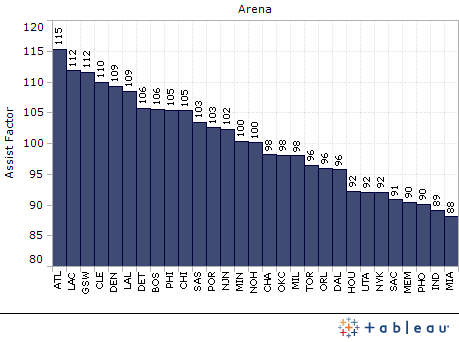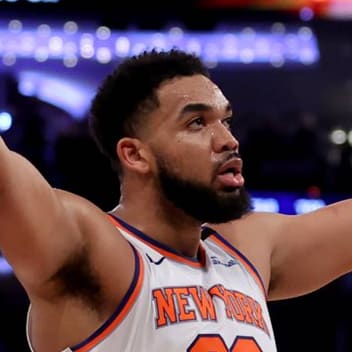Numbers can't lie.
It's not that numbers and statistics cannot be deceiving; in the wrong hands, of course they can. It's all in the interpretation. It is a fact, for example, that Gerald Henderson is scoring 15.3 points per game this season. Would he be such a good scorer on a better team where he wasn't the first option? Maybe not. Interpretations matter.
And that's where things get particularly fuzzy with assist totals. Although points scored and rebounds grabbed are easily recorded facts, the assist can get a little hazy. Just look at the definition, taken from that beacon of information, Wikipedia:
In basketball, an assist is attributed to a player who passes the ball to a teammate in a way that leads to a score by field goal, meaning that he or she was "assisting" in the basket. The player scoring must score within two dribbles of the basketball. There is some judgment involved in deciding whether a passer should be credited with an assist. An assist can be scored for the passer even if the player who receives the pass makes a basket after dribbling the ball.
With the assist, we venture down the very dangerous path of subjectivity. What may look like an assist to some may not go down as one in the stat sheet, and vice-versa. It's all up to the decision of the official scorer on press row. This leads us to the question: does every official scorer for each of the NBA's 30
Numbers can't lie.
It's not that numbers and statistics cannot be deceiving; in the wrong hands, of course they can. It's all in the interpretation. It is a fact, for example, that Gerald Henderson is scoring 15.3 points per game this season. Would he be such a good scorer on a better team where he wasn't the first option? Maybe not. Interpretations matter.
And that's where things get particularly fuzzy with assist totals. Although points scored and rebounds grabbed are easily recorded facts, the assist can get a little hazy. Just look at the definition, taken from that beacon of information, Wikipedia:
In basketball, an assist is attributed to a player who passes the ball to a teammate in a way that leads to a score by field goal, meaning that he or she was "assisting" in the basket. The player scoring must score within two dribbles of the basketball. There is some judgment involved in deciding whether a passer should be credited with an assist. An assist can be scored for the passer even if the player who receives the pass makes a basket after dribbling the ball.
With the assist, we venture down the very dangerous path of subjectivity. What may look like an assist to some may not go down as one in the stat sheet, and vice-versa. It's all up to the decision of the official scorer on press row. This leads us to the question: does every official scorer for each of the NBA's 30 teams dish out assists in the same fashion?
To answer this question, we can borrow a technique from baseball: the park factor. In baseball, for some inexplicable reason, there aren't regulation designs for its parks. Therefore, for example, players like Dante Bichette were able to set records at Coors Field in Denver while players like Adrian Gonzalez struggled to pass the 30 home run barrier at San Diego's cavernous PETCO Park.
And so we have park factors. A number over 100 means the park is favorable for the offense, a number below 100 favors defense, and 100 is average. The same principle can be adopted in basketball for assists. If a team and its opponents have more field goals scored as assists at home than on the road, the number will be greater than 100, and vice versa. Here's the actual calculation:
(Team + Opponents Assists/FG Made in home games)/(Team + Opponent Assists/FG made in road games)
If the issue of differently defined assists is actually a thing that matters, we should expect to see some numbers deviating from 100. And, as it turns out, that is the case:
Scorers for the Hawks, Clippers and Warriors seem to love assists, whereas in Phoenix, Indiana and Miami it practically has to be an alley-oop to get the dime.
The data looks at both the 2009-10 and 2010-11 seasons; the biggest difference in assist factor on a season-to-season basis was 11 points, in both Denver and Oklahoma City. Have we actually seen these supposed effects manifest themselves?
Unfortunately, it's difficult to measure, as there isn't a whole lot of point guard movement in the NBA. But in at least two cases where a point guard has moved from an average arena to an extreme arena, we have seen the effect:
Ramon Sessions, 2009-10 MIN (100): 5.4 AST/36 mins 23.3 AST%
Ramon Sessions, 2010-11 CLE (110): 7.1 AST/36 mins 35.0 AST%
Darren Collison, 2009-10 NOH (100): 7.4 AST/36 mins, 32.9 AST%
Darren Collison, 2010-11 IND (89): 6.1 AST/36 mins, 28.9 AST%
And although he's not exactly a point guard, this one probably counts too:
LeBron James, 2009-10 CLE (110): 7.9 AST/36 mins, 41.8 AST%
LeBron James, 2010-11 MIA (89): 6.5 AST/36 mins, 34.9 AST%
The LeBron example is particularly illustrative. Despite moving from a team containing secondary options like Mo Williams and Antawn Jamison to one featuring Dwyane Wade and Chris Bosh, LeBron's ability to assist seemingly went down. Not terribly intuitive, right? Well, here's what happens when we apply the assist factors.
2009-10: 7.2 AST/36 mins, 38.0 AST%
2010-11: 7.3 AST/36 mins, 39.2 AST%
Although three players does not a hypothesis prove, the anecdotal evidence here is strong, and I think the concept is sound. In all sports, it is very difficult to rely on a statistic that is subjective in nature. In may cases, basketball is free of this demon, thanks to the more absolute and objective nature of points, blocks, rebound, steals, etc. But when we rely on different people to be the arbiters of assists on a nightly basis, it should be no surprise we can get wildly different results. As with everything in fantasy sports, the savvy owner should just consider this statistical phenomenon to be just one more thing he or she can exploit.
Jack Moore can be found on Twitter @jh_moore.







































